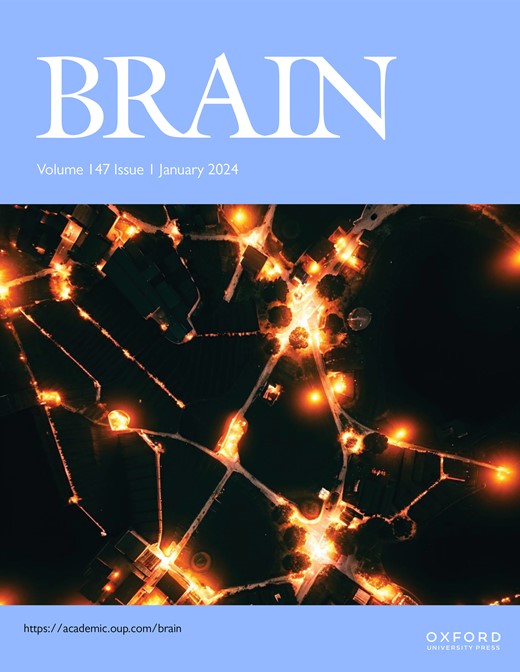PET-MRI biomarkers reveal efficacy of a novel NLRP3 inhibitor in Parkinson's disease models.
IF 11.7
1区 医学
Q1 CLINICAL NEUROLOGY
引用次数: 0
Abstract
Parkinson's disease is one of the fastest-growing neurodegenerative disorders, with no effective treatments to modify its progression. Microglial-driven neuroinflammation, mediated by NLRP3 inflammasome activation, plays a key role in disease onset and progression. The NLRP3 inflammasome is upregulated in microglia from Parkinson's disease patients and activated by oxidative stress and a-synuclein aggregates, triggering the release of pro-inflammatory mediators that contribute to neuroinflammation and neuronal death. MCC950, the first described specific NLRP3 inhibitor, has shown promise in Parkinson's disease models but is limited by suboptimal pharmacokinetics and safety, hindering its clinical development. Here, we developed a novel NLRP3 inflammasome inhibitor, MCC7840 (also known as Inzomelid or Emlenoflast), and utilised clinically relevant PET-MRI imaging biomarkers to assess its therapeutic efficacy in preclinical models of Parkinson's disease. MCC7840 inhibited NLRP3 in human and mouse microglia with nanomolar potency, while demonstrating improved systemic exposure, half-life, brain permeability, and bioavailability compared to MCC950. In a murine NLRP3 gain-of-function model of Muckle-Wells syndrome, MCC7840 effectively inhibited mortality and demonstrated superior potency compared to MCC950. Chronic oral administration of MCC7840 protected against neuroinflammation, motor deficits, and dopamine loss in both 6-hydroxydopamine and preformed α-synuclein fibril mouse models of Parkinson's disease. Radiotracer imaging of multiple PET markers in the same mouse revealed that MCC7840 attenuated neuroinflammation ([18F]DPA-714), preserved dopamine uptake ([18F]FDOPA), mitigated dopamine transporter loss ([18F]FBCTT), and reduced blood-brain barrier leakage (gadolinium contrast MRI). Notably, MCC7840 was effective in a slowly progressing 12-month α-synuclein model, even when administered after symptom onset, 4 months post-α-synuclein injection. These findings highlight the utility of PET/MRI as a non-invasive tool to evaluate drug efficacy and support MCC7840, and other brain-penetrant NLRP3 inhibitors, as promising disease-modifying therapies for Parkinson's disease, warranting future clinical investigation.PET-MRI生物标志物揭示了一种新型NLRP3抑制剂在帕金森病模型中的疗效
帕金森氏症是增长最快的神经退行性疾病之一,目前还没有有效的治疗方法来改变其进展。由NLRP3炎性体激活介导的小胶质细胞驱动的神经炎症在疾病的发生和发展中起着关键作用。NLRP3炎性小体在帕金森病患者的小胶质细胞中表达上调,并被氧化应激和a-突触核蛋白聚集激活,触发促炎介质的释放,导致神经炎症和神经元死亡。MCC950是首个被描述的特异性NLRP3抑制剂,在帕金森病模型中显示出前景,但由于药代动力学和安全性不理想,阻碍了其临床发展。在这里,我们开发了一种新型NLRP3炎性体抑制剂MCC7840(也称为Inzomelid或Emlenoflast),并利用临床相关的PET-MRI成像生物标志物来评估其在帕金森病临床前模型中的治疗效果。MCC7840在人和小鼠小胶质细胞中抑制NLRP3具有纳摩尔效力,同时与MCC950相比,显示出改善的全身暴露、半衰期、脑通透性和生物利用度。在Muckle-Wells综合征的小鼠NLRP3功能获得模型中,MCC7840有效地抑制了死亡率,并且与MCC950相比显示出更高的效力。慢性口服MCC7840可预防6-羟多巴胺和预先形成的α-突触核蛋白原纤维帕金森病小鼠模型的神经炎症、运动缺陷和多巴胺丢失。同一只小鼠的多个PET标记物的放射性示踪成像显示,MCC7840减轻了神经炎症([18F]DPA-714),保持了多巴胺摄取([18F]FDOPA),减轻了多巴胺转运体损失([18F]FBCTT),减少了血脑屏障渗漏(钆对比MRI)。值得注意的是,MCC7840在进展缓慢的12个月α-synuclein模型中是有效的,即使是在症状出现后,注射-α-synuclein后4个月给药。这些发现强调了PET/MRI作为一种非侵入性药物疗效评估工具的实用性,并支持MCC7840和其他脑渗透NLRP3抑制剂作为帕金森病有希望的疾病改善疗法,值得未来的临床研究。
本文章由计算机程序翻译,如有差异,请以英文原文为准。
求助全文
约1分钟内获得全文
求助全文
来源期刊

Brain
医学-临床神经学
CiteScore
20.30
自引率
4.10%
发文量
458
审稿时长
3-6 weeks
期刊介绍:
Brain, a journal focused on clinical neurology and translational neuroscience, has been publishing landmark papers since 1878. The journal aims to expand its scope by including studies that shed light on disease mechanisms and conducting innovative clinical trials for brain disorders. With a wide range of topics covered, the Editorial Board represents the international readership and diverse coverage of the journal. Accepted articles are promptly posted online, typically within a few weeks of acceptance. As of 2022, Brain holds an impressive impact factor of 14.5, according to the Journal Citation Reports.
 求助内容:
求助内容: 应助结果提醒方式:
应助结果提醒方式:


